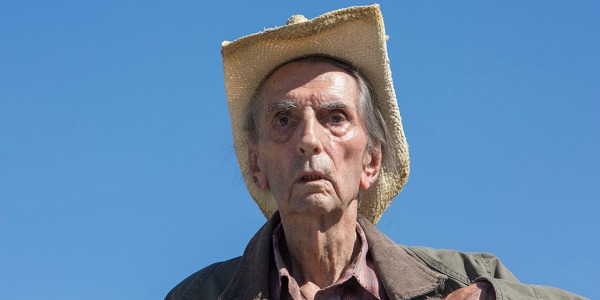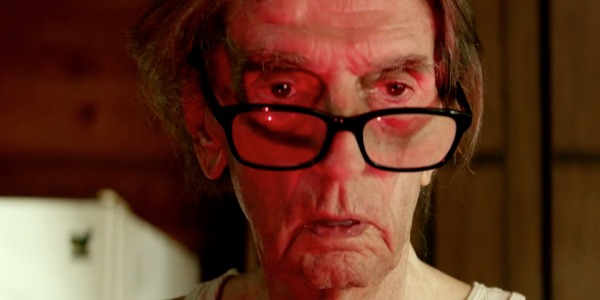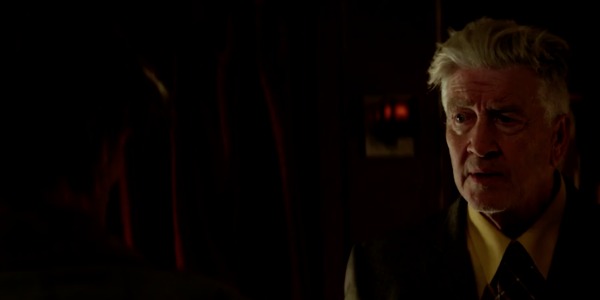LUCKY: A Love Letter To The Late, Great Harry Dean Stanton

Alex Arabian is a freelance film journalist and filmmaker. His…
The film and television world is still yearning for the loss of one of the greatest character actors in the history of cinema, Harry Dean Stanton. However, there is comfort for his fans in knowing he will live on forever through celluloid. Lucky is his second to last film he completed before he died, and an exhilarating culmination of his greatest hits as an actor, and one, final platform to give Stanton the chance to shine in a starring role. One of the greatest character actors of his own generation, in his own right, John Carroll Lynch, crafts a wonderful ode to Stanton’s talents and storied career.
Stanton’s other recent posthumous work can be seen in the upcoming biopic about Frank Sinatra and Ava Gardner, Frank and Ava, and David Lynch’s (who also stars alongside him in Lucky; no relation to director, Carroll Lynch) new season of Twin Peaks. Lynch, who’s directed Stanton in Inland Empire, The Straight Story, the film Twin Peaks: Fire Walk With Me, the television series, Hotel Room, and Wild At Heart, said this of Stanton: “The great Harry Dean Stanton has left us. There went a great one. There’s nobody like Harry Dean. Everyone loved him. And with good reason. He was a great actor (actually beyond great) – and a great human being – so great to be around him!” If there’s one person’s word you can take at face value, it’s David Lynch’s.
It was born out of passion; Logan Sparks, long-time friend and former personal assistant of Stanton whose life was changed after his time spent with him, co-wrote the film with his friend, Drago Sumonja. Sparks had wanted to collaborate with Stanton for years, but it didn’t make sense to him until this project’s inception; the titular main character directly reflects Stanton’s personality and philosophy and beliefs about life and death. It’s a character actor’s ultimate chance to have his voice heard. Lucky is the unfortunate but beautiful (beautifully written, beautifully shot, and beautifully acted) swan song of Stanton, one that truly earns and and quite literally deserves the oft overused film critic phrase, “the performance of a lifetime.”
Lucky The Man
Harry Dean Stanton is an atheist. Uh oh, I said the “A” word! At 90 years old, does living without the notion of a god, afterlife, or any kind of respite after death bother Stanton, or, in this case, Lucky? Not the slightest bit. He smokes like chimney and eats and drinks what he wants. “If they could’ve they would’ve,” Lucky replies to his local diner patron after a talking to about cigarettes causing death.

And such is Lucky’s daily routine: wake up, do some yoga, walk up the street to his diner to have his coffee with cream, cigarettes, and do his crossword puzzles, walk back home to watch his programs on the television, and frequent the local dive bar at night. It’s a simple way of living; it’s a life with so much complexity behind the body that occupies it. They say a picture is worth a thousand words. Well, Stanton’s face is worth a million: he can speak volumes without saying anything at all.
Lucky’s “spiritual” journey, if you will, begins with the realization that “realism” is a thing. “It’s the practice of accepting the situation as it is and being prepared to deal with it accordingly.” What he can’t fathom is the idiocy in this statement; it isn’t the theory of, “what you see is what you get,” because what you see, is not what Lucky, or any of us, for that matter, gets. We all see things different from the next person. These two themes of accepting death and the importance of the variance of existential perspectives among human beings is essential to telling Lucky’s story.
Can a 90-year-old white, male war veteran from a more conservative era change and become more accepting? Absolutely, and everyone behind the story, including Stanton, make sure that point is a centerpiece in Lucky.
The Color Red, Doorways, And Mortality
Among the vast, ethereal beauty of the desert in which Lucky takes place, Carroll Lynch intermittently scatters shades of the color red to represent Lucky’s impending immortality. From the scarlet sunrises and sunsets, a feeling of the beginning of the end is establish. Through motifs such as a blinking red alarm clock stuck at the midnight hour, the red cartons of milk that singularly occupy Lucky’s refrigerator, Lucky’s tartan plaid red button down that he wears daily, his preference of drink, Bloody Mary’s, the curtains of the bar that he drinks them at, or the red box of American Spirits that he slowly kills himself with, become subliminally engrained in the viewer.
Several characters who the audience encounters on Lucky’s journey through the film represent different stages of life and death by wearing various shades red. Slowly, the red becomes more basic, less varied in hue, bringing Lucky’s inevitable own reality to the film’s forefront. Is one ever too old to realize that their body has an expiration date? No, that sobering realization can happen at any time, even at the ripe old age of 90.

When Lucky opens a door and exits, Carroll Lynch expertly frames the shot, and, with the help of cinematographer Tim Suhrstedt, creates a blinding, almost overwhelming white light that pours into the frame and emboldens a silhouette of Stanton. It’s as if to say to the audience, each door Lucky crosses, it brings him one step door closer to death.
Instead of googling for information, Lucky uses his red chord phone to phone a mysterious pal to get his questions answered, usually to philosophically debate his ideas and the validity of the content of the crosswords that he works on. One could say that this mysterious landline is Lucky’s only link left to the living world. He’s a dinosaur, an off-the-grid recluse in the age of technological hyper-connectivity. Does that make him detached from reality or more in tune with it?
A Performance Of A Lifetime & A Trio Of Staggering Debuts
Lucky is a treat, literally a once in a lifetime film. It’s incredibly hard not to grin from ear to ear whilst watching the entirety of its 88-minute runtime, even when you’re crying. It’s a wonderful line that Carroll Lynch walks. To any film critic that gives Lucky a bad review, I’d say to them, “you have no soul.” That is, of course, if people like Stanton or me believed in a soul. Tom Waits can cut through the nonsense of the enigma surrounding death (or anything, for that matter) like no other; nobody can quite tell it like it is the way in which Waits can. Here’s some realism for you:
“What does it matter, a dream of love
Or a dream of lies
We’re all gonna be in the same place
When we die
Your spirit don’t leave knowing
Your face or your name
And the wind through your bones
Is all that remains
And we’re all gonna be
We’re all gonna be
Just dirt in the ground”
It’s a lyric that does Stanton justice, and screenwriters Sparks and Sumonja do a fine job of staying loyal to Stanton’s beliefs while also approaching a story with themes that seem bleak on paper with nuance. In fact, Lucky is consistently comical and poignant, oftentimes simultaneously. There aren’t many screenwriters who could make a conversation about a tortoise not only amusing, but profound to the point of tears.
For that matter, there aren’t many actors besides David Lynch and Harry Dean Stanton who could pull off the transition from paper to screen with such ease. As for Carroll Lynch? He goes above and beyond in incorporating powerful imagery and symbolism, but his greatest strength is letting his actors interact, letting a scene progress naturally and take its time.

Stanton, a World War II US military veteran, is a man of few words; he’s never had to use extensive dialogue to transfer a feeling from the screen to an audience because he’s perfected the art of conveying emotion beneath the surface, with his unique facial structure, mannerisms, and sullen eyes. When Stanton is given a sizable monologue, it makes his words that much more effective, and he consumes every piece of dialogue to which he’s given as if it was born from his own mind. Because, well, in fact, it was.
Stanton as Lucky is a performance that cinephiles won’t want to miss. He pours his heart and (nonexistent) soul into what will undoubtedly become known as his capolavoro. Oh, and who knew that Stanton had the singing voice of an angel? The talent was abundantly exuberant, and his onscreen star will never lose its glow. In that sense, he will live on immortally in the cosmos of film.
Lucky: Conclusion
Viewers are in for a treat with the supporting cast of seasoned character actors as well. Even with its mundane plot, Lucky never ceases to surprise beneath the surface of its philosophical narrative and with its flurry cameos (Tom Skerritt reunites with Stanton for the first time 38 years since Alien in what would become a touching goodbye from peer to peer).
Shot in eighteen days, from the unadulterated, sweeping shots of the southwestern American desert, to the intricate closeups, the calculated use of physical and sound wave spacing through staging and dialogue, celestial lighting, careful use of clock-like chromatics, and colorful performances, Lucky marks one outstanding directorial debut for Carroll Lynch and two storytelling debuts for the ages in Sparks and Sumonja.
Did you find Lucky more melancholy or comical? What is your favorite Harry Dean Stanton performance?
Lucky premieres theatrically to limited release in the US on September 29, 2017, and in Canada on October 6, 2017. For all international release dates, click here.
https://www.youtube.com/watch?v=2KLLkj84GAo%20Does content like this matter to you?
Become a Member and support film journalism. Unlock access to all of Film Inquiry`s great articles. Join a community of like-minded readers who are passionate about cinema - get access to our private members Network, give back to independent filmmakers, and more.
Alex Arabian is a freelance film journalist and filmmaker. His work has been featured in the San Francisco Examiner, The Playlist, Awards Circuit, and Pop Matters. His favorite film is Edward Scissorhands. Check out more of his work on makingacinephile.com!













